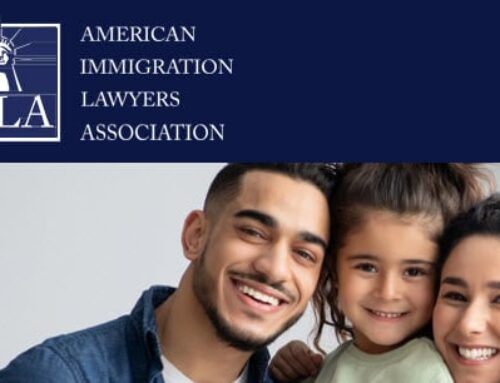USCIS Introduces New Edition of I-485 Application
As of December 23, 2022, U.S. Citizenship and Immigration Services (USCIS) has introduced a new edition of the Form I-485, Application to Register Permanent Residence or Adjust Status that they will start accepting. Anyone submitting an I-485 that is post-marked on or before December 22nd will be accepted, however, there will be no grace period on or after the 23rd. This means if you are planning to submit Form I-485 in the upcoming days, please note that your application will be rejected by USCIS if you submit the 07/15/22 edition on or after December 23rd.
How to Locate the New I-485
You can find the 12/23/22 edition of the form in the “Forms and Document Downloads” section of USCIS’ Form I-485 page.
Please note, as of February 1, 2022, USCIS may separate Forms I-765 from Forms I-131 filed at the same time in order to improve efficiency and reduce Form I-765 processing times for Form I-485 applicants. USCIS will adjudicate the request for employment authorization first and, if it is approved, they will issue an Employment Authorization Document without any notation about advanced parole. Form I-131 will be adjudicated separately and, if it is approved, an advance parole document will be issued.
Why Did USCIS Update the Form I-485?
On September 9, 2022, USCIS announced a final rule concerning the public charge ground of inadmissibility to help clarify and bring consistency to how it applies this ground of inadmissibility. This final rule goes into effect on December 23, 2022, and the 12/23/22 edition of Form I-485 allows USCIS to collect certain information required by the rule.
What is the Public Charge Rule
The Immigration and Nationality Act (INA) an applicant for a visa, admission, or adjustment of status is inadmissible if the consular officer, immigration officer, or immigration judge at the time of application for a visa, admission, or adjustment of status, finds the applicant is likely at any time to become a public charge. The rule applies to any noncitizen applying for a visa to come to the U.S. temporarily or permanently, for admission, or for adjustment of status to that of a lawful permanent resident (LPR).
The regulations at 8 CFR 212.21(a) define “likely at any time to become a public charge” to mean “likely at any time to become primarily dependent on the government for subsistence, as demonstrated by either the receipt of public cash assistance for income maintenance or long-term institutionalization at government expense.
Public cash assistance is defined as Supplemental Security Income (SSI); Cash assistance for income maintenance under the Temporary Assistance for Needy Families (TANF) program; or State, tribal, territorial, or local cash benefit programs for income maintenance, commonly called “General Assistance”.
Long-term institutionalization at government expense means government assistance for long-term institutionalization (in the case of Medicaid, limited to institutional services under section 1905(a) of the Social Security Act) received by a beneficiary, including in a nursing facility or mental health institution.
Factors USCIS used when evaluating whether an applicant is likely at any time to become a public charge are based on the totality of the applicant’s circumstances. Officers must evaluate all the information provided on the Form I-485, Report of Medical Examination and Vaccination Record (Form I-693), any other forms and evidence contained in the record, and statements by an applicant during an interview, if applicable. USCIS considers all information or evidence in the record that is relevant in the totality of the circumstances.
Form I-693 – Report of Medical Examination and Vaccination Record
USCIS extended the temporary waiver of the requirement that a civil surgeon’s signature on Form I-693, Report of Medical Examination and Vaccination Record, be dated no more than sixty days before the date it is accepted by USCIS. Pursuant to the extension, Form I-693 dated more than sixty days prior to USCIS acceptance will remain acceptable until March 31, 2023, so long as the case has not been adjudicated.
Form I-693 is required for applicants seeking to adjust status from within the United States to become lawful permanent residents. The form is signed by a civil surgeon following a medical exam to establish that an applicant is not inadmissible to the U.S. on public health grounds.
Typically, USCIS a completed Form I-693 is valid for two years from the date of the civil surgeon’s signature, but only if it is received and accepted by USCIS within sixty days of the civil surgeon’s signature (commonly referred to as the “sixty-day rule”). Due to extensive processing delays related to the COVID-19 pandemic, USCIS previously waived the sixty-day rule until September 30, 2022, but on September 29, 2022, USCIS extended the waiver until March 31, 2023.
This alert is for informational purposes only. If you have any questions, please contact us via email at info@poonahimmigrationlaw.com for further information.




